Asking yourself how often you should post on your blog?
I hear you.
Business owners focusing on content marketing ask this question often.
And for a long time, there was NO data-supported answer.
Until now. 🤓
In the last few years, there have been some groundbreaking studies surrounding blogging frequency and success.
So, no more “Well, here’s what I do that the person before me did…” or “I’ll just do what my competitor is doing… they must know.”
The proof is in the pudding, and these eye-opening results are REAL. And more than real, they’re important and wildly helpful for content marketers.
Exciting, right?
As a content nerd through and through, I’m simply obsessed with what the data has proven.
And since I eat, sleep, and breathe content (I’ve been talking about it for over 10 years), I knew I needed to compile these incredible findings and get the “how often to blog” question answered.
After you read this, you should have an idea of how often you should post on your blog.
You already know lots of businesses make money blogging. But how often should you post to your blog to get in on that action, too? We’ll answer all your questions and more in this article.
So, let’s get to it and break down the data around blogging and what it means for YOUR business. 💥
Ready to get more out of your life by building a powerful digital business through content, and leading a business and marketing plan that DOESN’T suck you dry? My coaching system for creative entrepreneurs, The Content Transformation System, will get you OUT of the grunt work and INTO the delight zone.
Burning Questions: How Often Should You Post on Your Blog?
One of the first questions my content coaching clients usually ask me is, “How often should a business blog?”
To answer this as accurately as possible, I looked at findings from both HubSpot’s State of Marketing and Blogging Frequency reports (along with a few others I’ve linked to within the content).
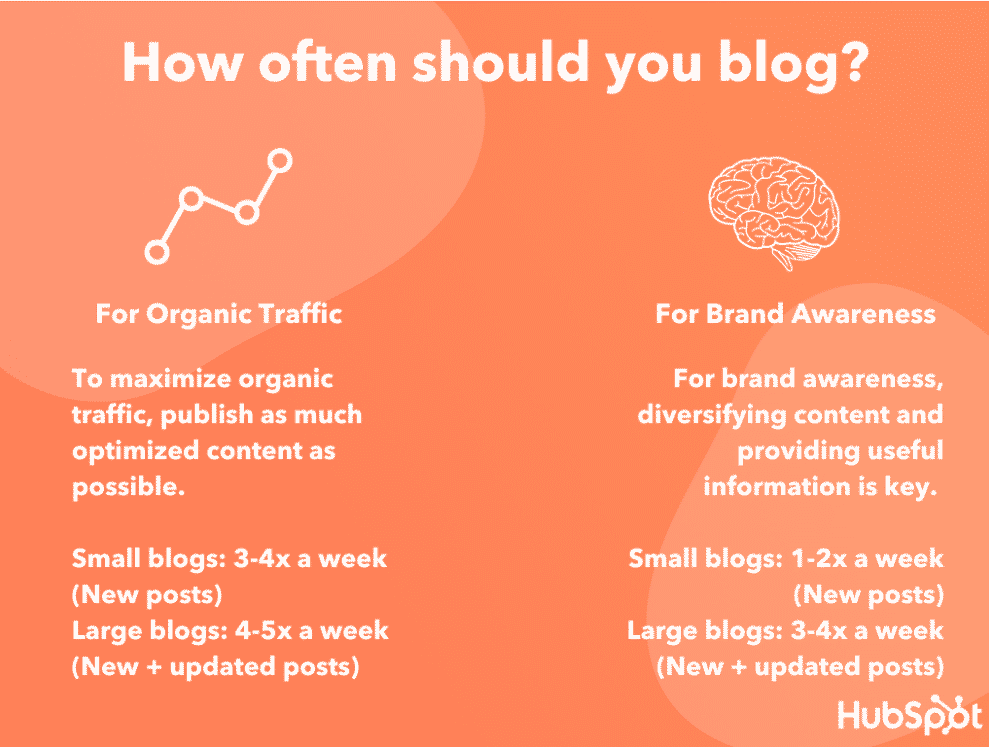
While these studies contain groundbreaking findings for the content marketing industry, the Blogging Frequency report (my favorite!) was massively helpful because the participants and questions were SO specific.
The study surveyed 13,000+ bloggers to pinpoint some burning questions like:
- How many blog posts per week?
- How many words should a blog post be?
- How often should you blog for SEO?
- How often should I blog to make money?
- How many articles should a blog have?
- How many blogs should I have?
This information is super important to winning at the content marketing game, so these are all common things I’m asked, especially by savvy entrepreneurs trying to figure out how to build wealth.
Luckily, the data gathered in the article has your answers.
6 Key Findings on Blogging Frequency
There’s a whole lot of juicy data to dig through in these reports, so I took the most impactful and important and listed them here. We’ll cover these findings further down in this article.
If you’re just learning how to start your content business, make sure to read each point – there’s some nuance in these findings and how they’re related to each other (and how many posts YOU should be publishing to your blog).
Here’s a summary of the answers to these very important questions for content marketers:
- Generally speaking, the more content a blog has the higher the traffic.
- Consistently posting 3 or more times per week gets a huge increase in traffic.
- Long-form content performs the best over time and bloggers who earn over $50,000 per year say their most popular posts are 2,424 words long.
- The #1 most important factor among all bloggers is quality content.
- Evergreen content performs the best and is the easiest to update.
- Updating old content is just as important as creating new content.
What does this tell us? 🧐
That consistency, quality, and quantity are of PARAMOUNT importance.
Setting up a system to create this for yourself will be work, but I promise you… it will pay off.

For people just starting out in content marketing, it can be pretty eye-opening to see how much is involved. But that’s why learning how to create a content strategy is so important to profiting online.
But the numbers are in. Regular and consistent publishing of high-quality blogs leads to an increase in traffic and leads. 📈
Want to learn how you can build a business that sustains itself after you set up the processes and systems? Catch my free webinar: How to Build Your Self-Sustaining Online Business in 90 Days (Without Burnout from Overcomplicating It)
Answered: How Often Should You Post on Your Blog?
When business owners are researching how often to post on a blog, they usually end up realizing it’s going to require consistency.
Why?
The data shows that publishing 2 – 4 blogs per week gets the highest results in both traffic and conversions.
Based on these reports, a good goal to set is to publish 11-16x per month.
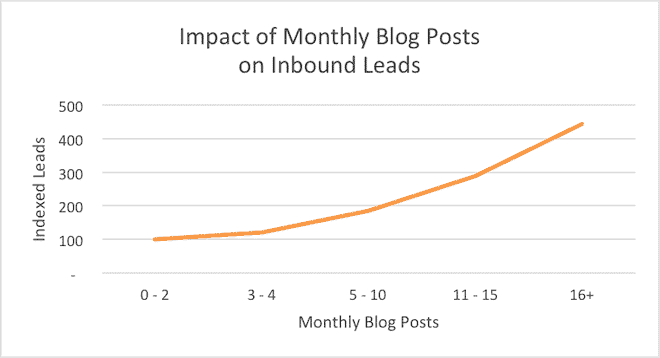
These stats tell us that content marketers are putting some serious time into posting frequently and consistently. 💻
If you’ve been looking into content marketing for any length of time, these numbers probably don’t surprise you. More and more businesses are realizing how important this is. In fact, 27% of B2C content marketing teams increased their size in the last year to keep up with buyers’ demand for content.
But here’s the thing.
…sustainable online success doesn’t just appear by blogging as much as possible. I KNOW this. And the data backs it up.
Quality and consistency are of equal importance.
This includes a strong SEO strategy and a repeatable publishing process, among other things.
So, whether you’ve got a huge team of people or you’re blogging for small business, every brand has different content needs, including yours. ✏️
So, let’s dig into more of what this revolutionary data taught us about content, blogging, and how this relates to turning YOUR business into a viable, profitable venture.
1. More Content = More Results
Today, 93% of the world’s entire global traffic comes from Google.
Meaning blogging statistics OVERWHELMINGLY prove that your blog is your key to getting discovered. 🔑
But does it really matter how many posts are on your website?
Yes, according to the data. 📊
Generally, the more frequently you blog, the more traffic you’ll get (but quality remains important).
But finding time to create and promote content is the biggest challenge for bloggers. Creating content takes time, focus, and unique skills. This is likely why 53% of bloggers struggle with this part of content strategy the most.
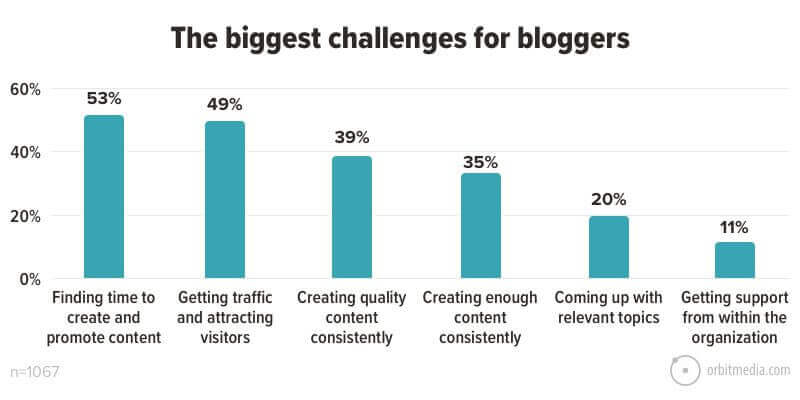
I’ve addressed the “how to promote my content” question previously and I know there’s no get-viral-quick route available.
It’s true. You’re going to have to put in some time creating a healthy amount of blog posts to see success in the long run.
And not just once. Repeatedly. 🔁
That’s why delegating tasks to others with digital marketing skills is so important. You can’t do it alone, and it must get done to see the kind of success your business is capable of.
So, your team will need to learn how it’s done if they don’t already have content skills.
But it’s going to be worth your time. Because these studies found that the more blogs you’ve published, the more traffic you’ll get (and then hopefully more leads and conversions).
You can see by the chart below that HubSpot discovered more content does equal better results. They found that if a branded blog (i.e. mygreatdomain.com/blog) had MORE than 400 total posts, it received about 2x as much traffic as blogs with LESS than 400 posts.
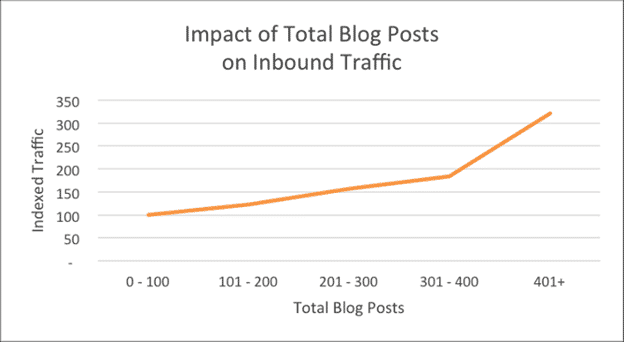
And this applies across every industry and niche — Both B2B and B2C companies get more leads the more blog posts they publish.
But does this mean you should be pumping out blogs multiple times a day until you have as many as humanly possible?
Is the answer to “How often should you post a blog?” really “As much as possible”?
Nope. More content is not the answer.
Simplifying is. 😌
Getting more content published is just ONE piece to a bigger system of content strategy. People who find success from their blogging frequency tend to have a repeatable process (that’s sustainable).
That’s their secret.
And it’s 100% more impactful than just writing blogs to hit a specific number.
That’s why blogging consistently is SO important, as you’ll learn up next.
2. Consistent Blogging Frequency Is Crucial
I’ll never forget the first coaching call I took with one of my most successful clients.
She immediately asked me, “How many times should I post on my blog?”
I reminded her of what the data says:
Consistency is more important than frequency.
In fact, bloggers are posting less often than they used to!
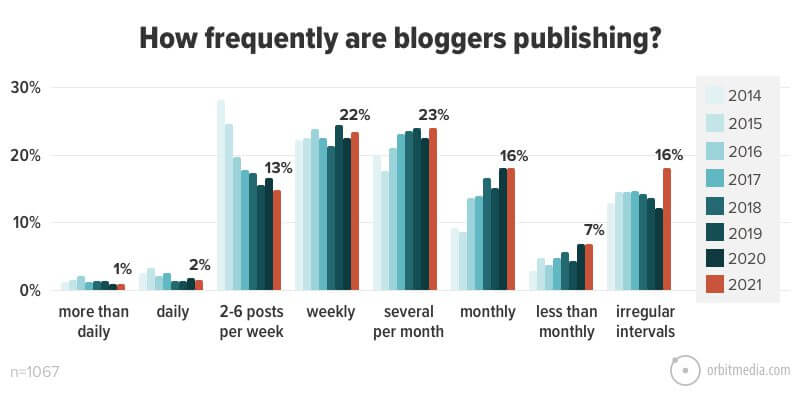
What’s one reason bloggers are publishing less often?
Looking at the data, it’s because they’re focusing on creating consistently high-quality posts. In truth, content marketers spend much more time and effort on creating a blog than they did in 2014.
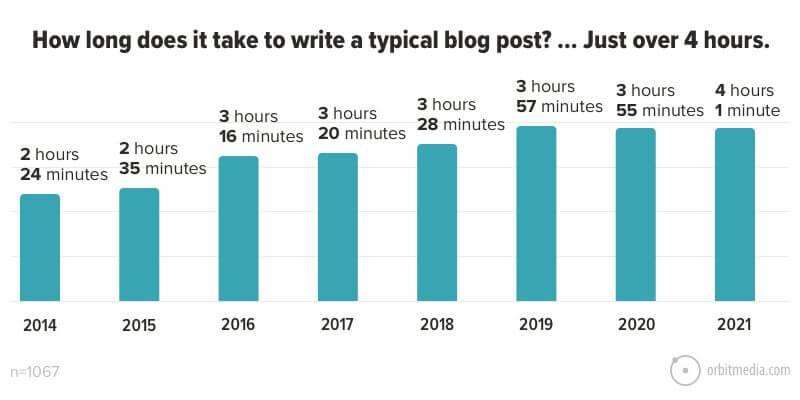
So, what can we learn from this change?
Experts in content marketing know this means that keeping a schedule and editorial calendar when blogging should be a top priority to build:
- Brand awareness
- Organic traffic
- Organization within your content team
- High-quality content
Google can crawl through every article you publish. This gives EVERY piece of stellar content you create the chance to increase your search engine rankings while also building awareness of your business.
It’s SO cool. 😎
I can personally attest to how exciting it feels to watch your piece of content (once just an itty-bitty idea in your head) burst into this world and rise to the top of Google’s rankings.
But more importantly, it’s SO effective: The #1 result in Google searches gets 32% of ALL clicks.
So how do you tap into this powerful marketing tactic without getting burnt out?
By having a plan for your blog writing and sticking to it, which I cover in my free webinar.
When my coaching clients and I cover the topic of blogging frequency within digital marketing, a lot of people are shocked.
Why? You guessed it — many businesses don’t have a marketing strategy that includes writing, let alone a plan that includes committing to writing articles for a target audience consistently. 😬
But they absolutely should.
Just look at some other important stats regarding blogging regularly:
- B2B companies publishing 11+ blog posts per month receive 3.75x more leads.
- Publishing 2-4 blog posts per week offers the highest conversion rate and traffic.
- When it comes to monthly frequency, publishing 16+ blogs per month offers 4.5x more leads (compared to 4 or fewer per month) and 3.5x more traffic.

I know posting consistently sounds hard if you haven’t been doing it. But just because it’s hard doesn’t mean it has to be difficult.
It’s completely possible with the right mindset and an established process.
Feeling confused?
I’ve built an incredible system and solution for you. The car 🏎 is here.
The keys 🔑 are one decision away:
Ready to run a SUCCESSFUL digital business? Apply for The Content Transformation© System now.
3. Long-Form Content Is King
Think businesses are getting leads online solely by having a killer social media?
Think again. ❌
Long-form blogs are the most impactful content to create.
Long-form content is best because it WORKS. It drives amazing results over time. And this type of content is skyrocketing in popularity, while shorter posts are on their way out.
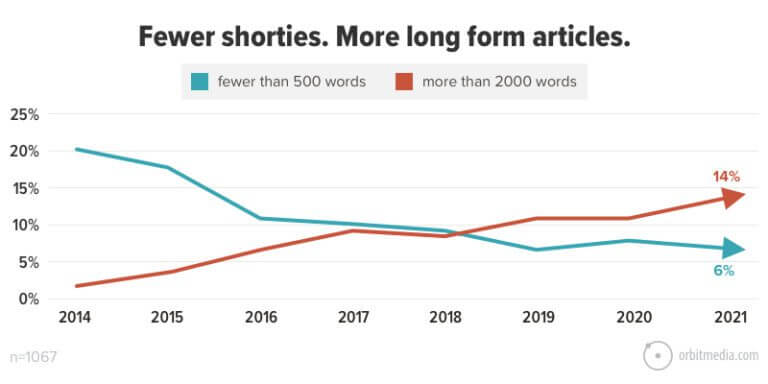
Here’s why you NEED to be OK with hollering “Don’t let the door hit ya!” to shorter content. 🚪
Sure, 75% of people prefer reading articles under 1,000 words. However, longer articles do better in rankings and website visits because they’re more comprehensive. Buyers crave meaty content that can help them make a purchasing decision and builds their trust.
So, what’s long-form content?
Long-form content aims to help. It’s written to serve your target audience. And then, it converts like wildfire. 🔥
Has someone on your team asked you “How many words should a blog post be?” to qualify as long-form?
Bloggers that earn over $50,000 per year say their most popular posts are 2,424 words long. That’s 83% longer than the average post length of low-income bloggers.
That’s why long-form content is SO important when trying to figure out how often you should post on your blog.
The proof is in the data — blog posts are the most popular type of content being produced at 92%.
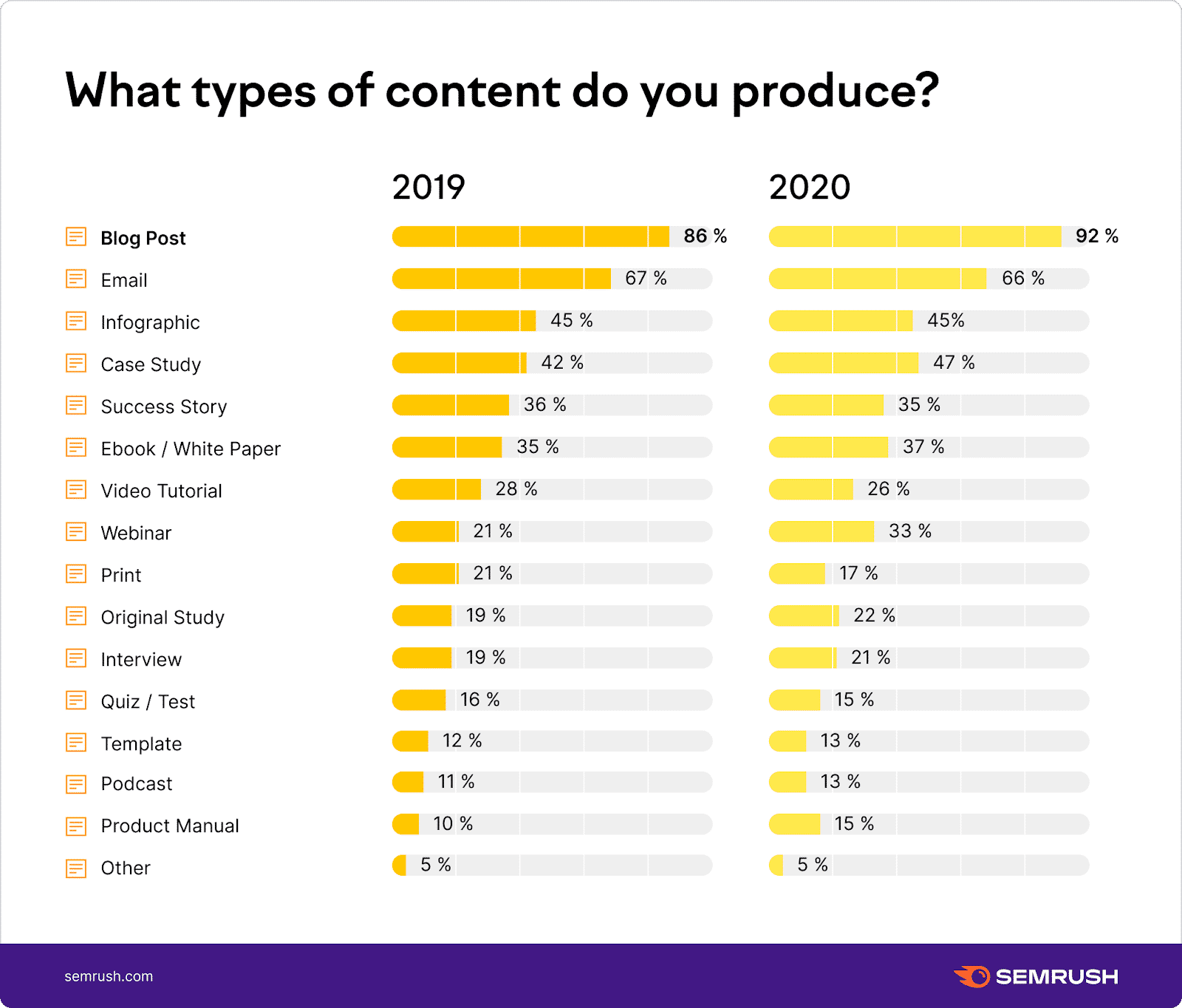
And long-form content’s popularity isn’t slowing down anytime soon.
That’s a lot of focus going into writing blogs. What does that mean for you? Simple.
It means you need a content strategy. 📚
- But WHY are so many people just winging it when these stats prove how important long-form content creation is?
- Why is consistently publishing long-form content so daunting to people that writing is THE most outsourced role in content marketing?
- How could so many people be ignoring something that’s going to be worth $600 billion in 2024?!
Because they don’t know how to do it.
And because content isn’t easy. You’re going to put in hard work. 💪
But here’s the good news. The process can be simple… if you have a content strategy.
4. Quality Blog Content Matters
So, how often should you post on a blog if you’re not producing high-quality content?
Never. 🛑
Really! I mean that.
Don’t waste your time producing content that isn’t helpful and doesn’t bring you leads. It’s not a good look OR use of your time.
That’s because the data shows that buyers use content as a way to determine trust with brands. Here’s what the research says:
- 95% of B2B product buyers admit they view content as a trustworthy marker to evaluate a business.
- 82% of consumers feel more positive about a brand after reading custom content.
- 60% of consumers enjoy reading relevant content from brands.
- Content marketing makes 70% of consumers feel closer to a company. (🥰 Awww!)
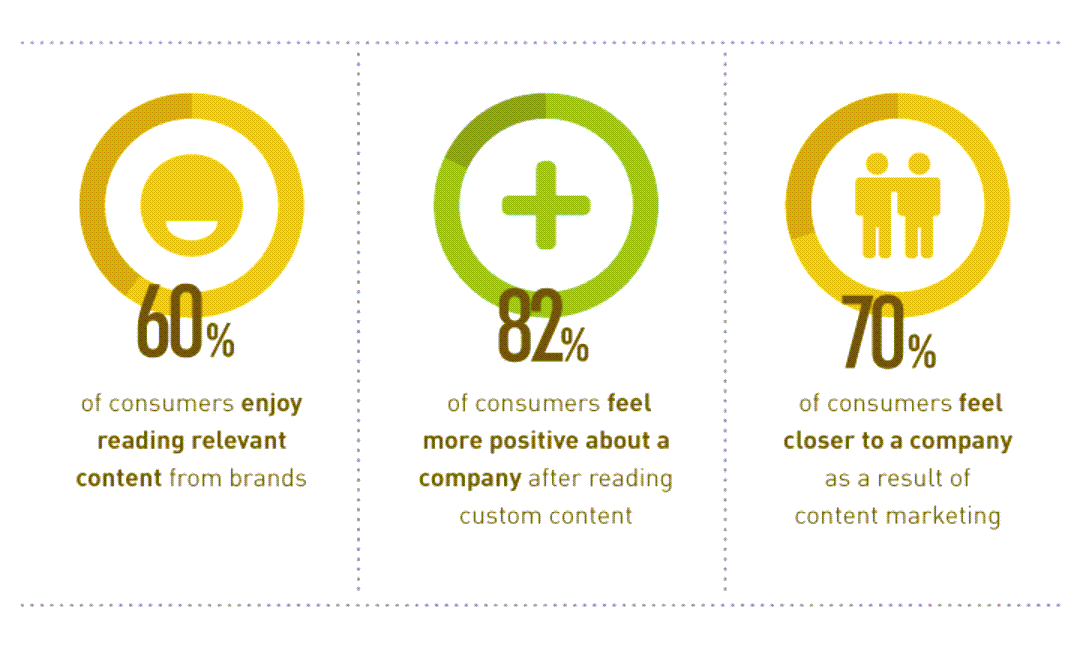
Source: Demand Metric
What do these amazing numbers illustrate? That personalized, top-notch content is a key ingredient in the recipe of a profitable website. 👩🍳
So, if you take anything away from this, it’s that high-quality blogs help you make more sales.
But what exactly goes into a terrific blog?
Well, top content marketers know it’s a mix of a few repeatable strategies, but one of the most important is using SEO strategies when planning, researching, writing, and publishing articles.
These studies show that a quality blog post includes using relevant keywords. But exactly how important is content for SEO?
It’s HUGE.
It’s so important, in fact, that most content marketers perform keyword research for search engine optimization during the content creation process.
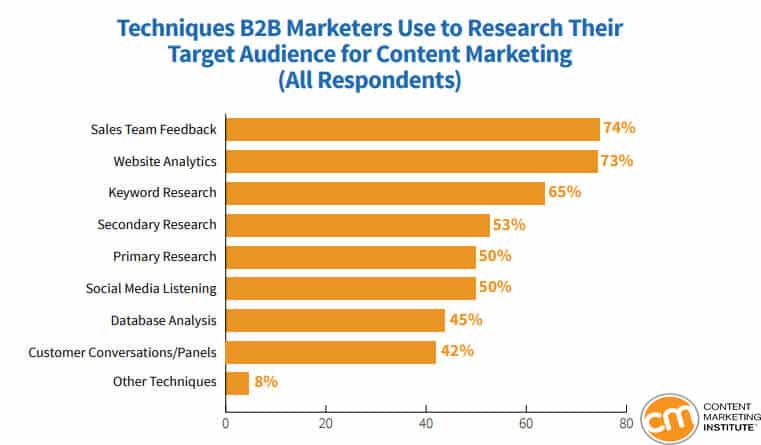
Please, don’t get caught up with intimation or self-doubt when you hear words like keyword research and SEO writing techniques. You can learn to do both like a pro if you believe in yourself. 🙏
And here’s why now’s the time to roll up your sleeves and learn how to do keyword research like a pro and write for SEO yourself:
- Keyword research has become much easier thanks to helpful content marketing tools.
- Shoppers are using Google to find products and services more than ever, so crafting SEO-friendly content is extremely important. 📢
- This is likely why 75% of brands say that the most efficient content marketing tactic they use is Search Engine Optimization.
- 34% of buyers will make an unplanned purchase after reading quality, personalized content.
Over one-third?!
That’s a huge percentage of buyers… however, the key word is quality.
Without it, you won’t see the wins you’re capable of. Google (and your readers) will notice bad content in a heartbeat. 💓
Plus, you’re a creative entrepreneur that has been called for more than a 9-5 that builds someone else’s dream. That means the quality of content your brand produces needs to be grade-A – no excuses.
If you’re willing to go all-in on your future and learn the inner workings of a successful digital business, head over to my free class right away.
5. Keeping Content Evergreen Is Important
The data’s in, and it’s now more important than ever to keep your content evergreen. Researchers proved it’s incredibly valuable when learning how to create content for your business that you make sure it can stay relevant and be easily refreshed.
This fantastic study by Backlinko looked at 3.6 billion articles to learn why certain types of content will continually get shares, backlinks, and traffic over time.
They found that not all content is created equal.
Keeping things evergreen is actually way easier to do with specific types of content.
The study observed that when it comes to creating evergreen blogs, the most effective content includes Best of Lists, How-to Guides, and data-heavy posts.
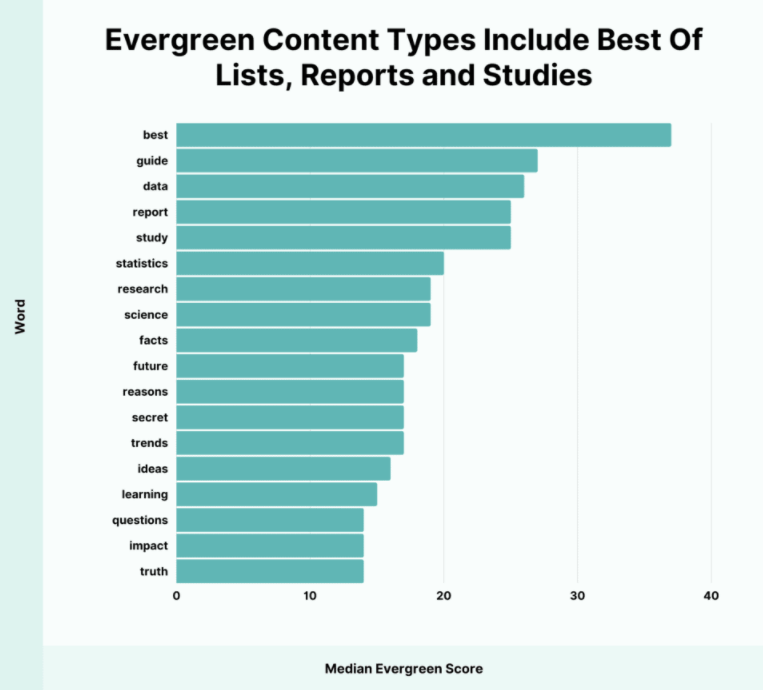
So, content that lists out the “best” of a certain topic ends up having the highest evergreen score. The study also found presentations and press releases tend to be the least evergreen.
Meaning, readers value curated, helpful, and personal content that’s timely. And they’re valuing it more than ever before, as they get better at searching and developing “shortcuts” to finding the most relevant content out there.
Need some inspiration? Here’s an evergreen content example to feast your eyes on (one that was actually part of the HubSpot study).

This list post can be easily updated without needing to change the entire post.
Updating content like this can include something as simple as adding an 83rd home decor idea and then updating the title to reflect that change (along with some SEO research to see how it’s performing, of course. You’ll want to do that to uncover other opportunities for improvement while updating your piece).
And here are some other examples of evergreen content topics from Social Media Examiner that are most likely updated often to remain relevant, timely, and helpful to the reader:
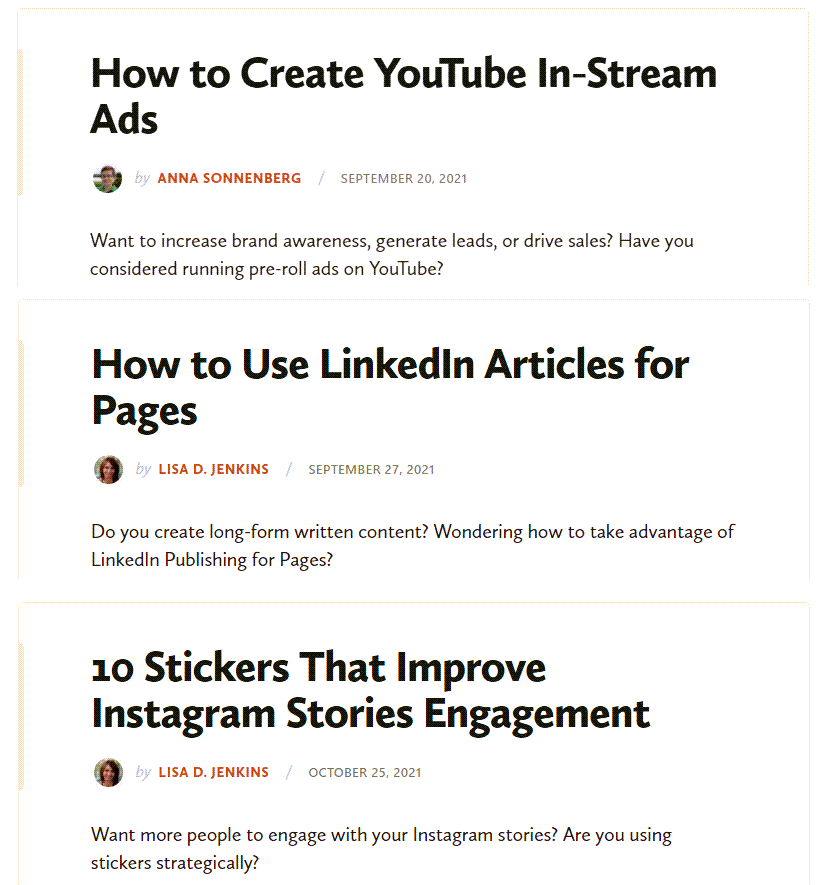
So don’t forget about writing “evergreen” like this whenever possible. The success of this kind of high-quality and relevant content is an enormous reason why content marketing ROI statistics are so astounding. ✨
6. Updating Old Content Is Vital
We’ve covered that quality, quantity, and consistency have a huge impact on the success of your content marketing.
But there was another interesting revelation that the blogging frequency data uncovered:
Your content process needs to include updating your old blog content regularly and consistently.
The data shows updating your old blogs is very, very important. So important that HubSpot gets nearly 92% of its leads from old posts. 😮
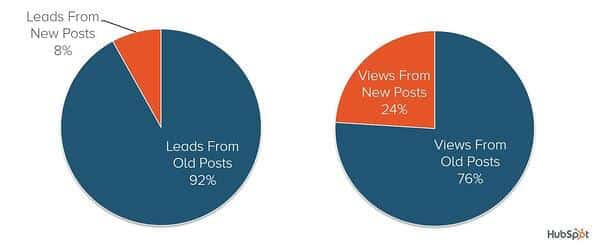
A good explanation of this? Like a fine wine, Google favors high-quality content that has aged a bit.
Because more and more NEW content is created every day.
And most of it sucks (#sorrybutnotsorry).
But that’s precisely why creating high-quality content pieces that you can optimize and keep evergreen will help give your brand exposure through searches.
So now that you know how important updating your old blog content is, you may now be wondering how often to update a blog.
Check this out:
I always love the look on some of my client’s faces when I tell them updating old content for my business is 90% of my content strategy.
That’s a whole lot of updating. 🤯
I cover my process and how I’ve made it part of my strategy in my article on how to update old content, or you can check out the video below if you’d prefer to watch me share my full process. 👇
But, let me ask you this:
Do you feel comfortable creating your own process?
Still trying to figure out how this whole content marketing thing will work for you?
Confused about how often to post blog content and how it applies to your specific industry and niche?
I can help you.
No more wasting time asking yourself these questions while scrambling to keep up with the latest trends and changes in content marketing.
If you’re ready to get serious about your business, it’s time to invest in your content marketing strategy and hire a mentor.
Ready to Invest in Content Marketing & Yourself?
So…how often should you post on your blog?
It depends.
But figuring out the sweet spot for your business is a wise move.
Because by the year 2025, 80% of B2B sales interactions will occur via digital channels.
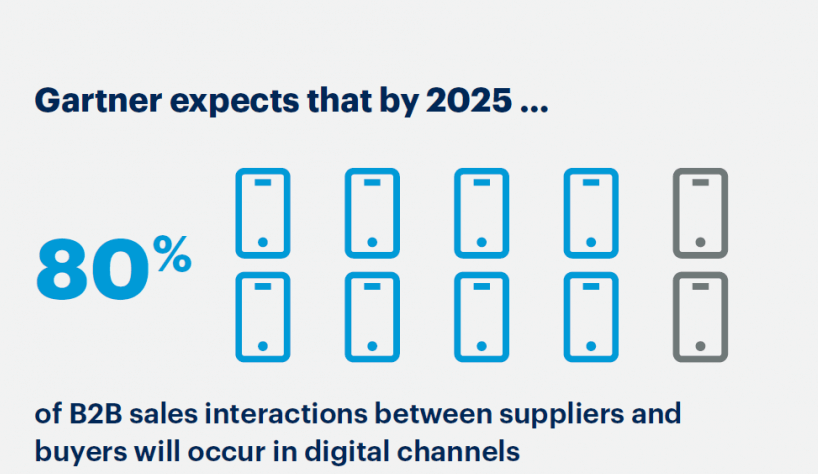
It’s evident that creating consistent, high-quality long-form blog content is pivotal to success online for your business.
But it’s up to you to invest in that.
Because 79% of B2B companies say they already have a content marketing strategy. Does yours?
I can show you exactly how it’s done.
If you want the game-changing details on how to have lasting impact through content marketing, you’re in the right place.
That’s what my Content Transformation System is all about. In this coaching program, I’ll teach you how to set up your business, systems, and marketing in 90 days or less. 👏
Plus, I’m in the trenches with you. You can tap into my decade-plus content creation experience and knowledge on everything — from building a powerful digital business through content all the way to leading a business and marketing plan that doesn’t suck you dry.
You’ll be working with me each step of the way. If you’re one of the few we say YES to working with, prepare for colossal business success like you’ve always known you were capable of.
Apply today to get in the program!
Want a taste of what you’ll get in the program? Check out my free 30-minute training.










